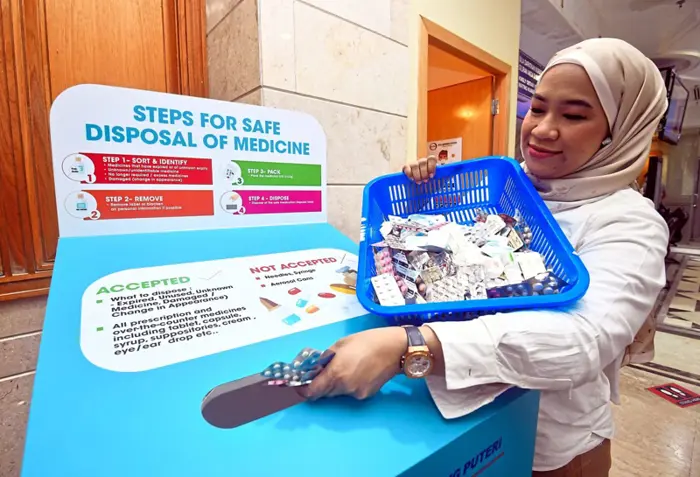ANN/THE STAR – Proper management of medicines should start with obtaining registered medicines and end with the safe disposal of unused or expired ones.
It is essential to ensure they provide the desired effects and do not cause harm. Many assume that proper medicines management only involves correct intake and storage.

Community Practices
Medicines disposal is often overlooked, with many believing they can be discarded like regular household waste.
A 2019 study in Selangor involving 426 adult respondents found that 84.9 per cent disposed of expired or unused medicines with their household rubbish. Similar findings emerged from a 2021 study involving nearly 1,000 respondents from the Klang Valley.
In this study, almost two-thirds of patients with chronic diseases disposed of their unused medicines either in the household trash, into the toilet, down the drain, or by giving them to someone else.
Stockpiling medicines
Both studies also listed factors that contribute to the accumulation of medicines at home, necessitating their disposal.
These factors include:
> Patients collect their medicines at health facilities even through they still have sufficient supplies at home
> Changes of patient’s prescription based on the patient’s current health status
> Habit of purchasing medicines unnecessarily for future needs
> Non-compliance with prescribed medicines, especially among patients with chronic diseases, and
> Patients discontinue treatment when they feel better or opt for traditional products as an alternative.
Effects of improper disposal
It is vital to emphasise the importance of proper and safe disposal of medicines within the community.
Improper disposal methods can have negative impacts not only on humans but also the environment.
Disposing of medicines together with domestic waste, into toilets or sinks at home, or directly into drainage systems can cause pharmaceutical contamination of water sources such as rivers, lakes, ponds and seas.
These water sources are subsequently processed and treated for human daily activities, including as sources of drinking water.
Numerous scientific studies have been conducted in detecting pharmaceutical waste in water sources, measuring its concentration levels, and evaluating its impact on the quality of drinking water resources, aquatic life and human health.
For instance, a global study in 2021 found that river water samples taken from 1,052 study locations across 104 countries worldwide contained detectable levels of pharmaceutical waste.
Worryingly, samples taken from Sungai Langat in Selangor were found to contain a high concentration of pharmaceutical waste, ranking it among the top 20 polluted rivers in the country.
The most detected pharmaceutical wastes were carbamazepine (an antiepileptic), metformin (an anti-diabetic) and caffeine.
The risk to human health is likely to increase with prolonged exposure to pharmaceutical waste found in drinking water sources.
This is because many pharmaceutical wastes can interfere with the functioning of the body systems, such as the endocrine and nervous systems, and may increase the risk of cancer.
Pharmaceutical waste from the antimicrobial group, such as antibiotics, can contribute to the issue of antimicrobial resistance.
If this problem is not contained, the healthcare system will face a severe situation in the future, where there will be no effective antimicrobials left to treat microbial infections, potentially leading to fatal outcomes.
Improper medicines disposal contributes to environmental pollution and can significantly impact ecosystems.
For instance, studies conducted in the 2000s revealed that the pollution of rivers and lakes with waste from contraceptive medicines caused adult fish in the contaminated habitats to change sex from male to female.
Additionally, these pharmaceutical wastes can persist in the food chain, starting with plankton; a primary nutrient source for aquatic animals and ultimately reaching humans who consume these animals as food.
Strategies to address the issue
Recognising the serious consequences of inappropriate medicines disposal, this improper practice should be stopped immediately.
Community awareness about the importance of proper medicines disposal needs to be fostered.
Simultaneously, the public should be educated about the proper ways to dispose of medicines.
The public should ensure that spoiled, expired, or unused medicines are not thrown into domestic trash cans, toilets, or sinks.
Instead, these medicines should be taken to collection centres at public or private health facilities, or selected chain pharmacies for proper disposal.
From these collection centres, the medicines will be transported to disposal centres where they will be burned at very high temperatures in incinerators.
This method ensures that no pharmaceutical waste enters the water sources.
In fact, the Malaysian government is working on introducing the MyMediSAFE programme, an initiative focused on the safe disposal of medicines.
This initiative will be implemented in collaboration with various strategic partners from the public and private sectors, including health facilities, community pharmacies, pharmaceutical companies and industries.
Through the MyMediSAFE website, members of the public are able to locate the nearest medicines collection centres and stay updated on current information about the proper disposal of medicines.
Improper medicines disposal practices can be mitigated by ensuring that patients do not have excess medicines in their possession.
Patients are advised to consistently adhere to their treatment regimen.
When replenishing medicines supplies from healthcare facilities, they should proactively inform healthcare providers on the amount of remaining medicines at home.
This ensures medicines are supplied in an appropriate quantity and subsequently prevents medicines stockpiling.
Additionally, avoiding unnecessary purchases of medicines can also help prevent medicines stockpiling at home.
Safe disposal of medicines is everyone’s responsibility
Proper disposal of medicines is important not only to ensure proper management of medicines at home but also to reduce the risk of negative impacts on human health and the environment.
Therefore, efforts to address the issue of improper medicines disposal must be fully supported by all parties.
While the roles played may vary, synergistic actions can help achieve the environmental sustainability goal for future generations. – Mohd Shahiri Abd Ghapar


